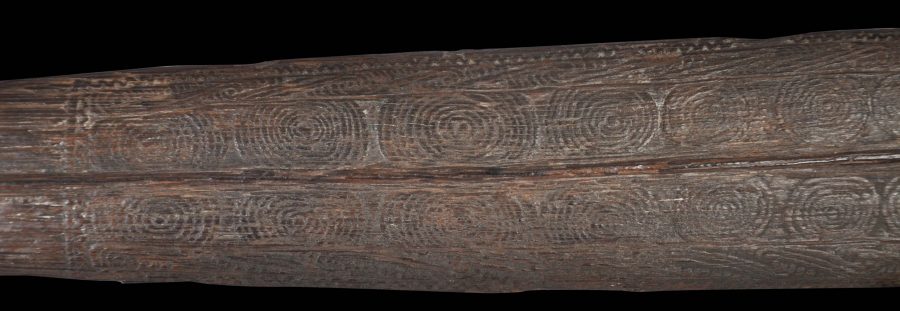Enquiry about object: 5443
Early, Carved Wooden Massim Sword Club or Lime Spatula
Massim area, Trobriand Islands, Papua New Guinea 18th-19th century
length: 62.5cm, width at widest point: 8cm
Provenance
UK art market
This exceptional large lime spatula-style sword club has indisputable great age. Acquired in the UK it almost certainly came to the UK during colonial times and clearly already was very old when it arrived. Every part is weathered and worn from age and use.
Of conventional paddle or oar-shape form, but with highly stylised zoomorphic features, it has a pierced handle or grip and on the principal side, a long, tapering blade with a raised mid-rib. This side is also incised in low relief with fourteen spirals within scrolled borders. The grip also is carved with curvilinear scroll work. The reverse is plain and devoid of carving – it, like the other side, simply has exceptional patina.
The zoomorphic aspect of the form is suggestive of a cuttlefish (siwai) – perhaps it was intended that the club would be inhabited by a protective siwai spirit (Peltier & Morin, 2007, p. 184).
It has been carved from a single piece of a local species of dark ebony.
Lime spatula clubs were used as both ceremonial clubs by men and possibly also as crushers and spatulas for powdered and burned seashells which was the main source of lime which was mixed with betel nut for chewing – betel nut being a mild social narcotic.
Massim culture is influenced by its island home. The region comprises a series of small islands linked by canoes. Accordingly, Massim art and motifs reflect the sea – designs are influences by water and ripples and forms relate to canoe cultures. The club here for example has the overall form of a paddle.
The example here has a fine sculptural form and with the most splendid patina and colour.
References
Peltier, P. & F. Morin, Shadows of New Guinea: Art from the Great Island of Oceania in the Barbier-Mueller Collections, Somogy, 2007.






